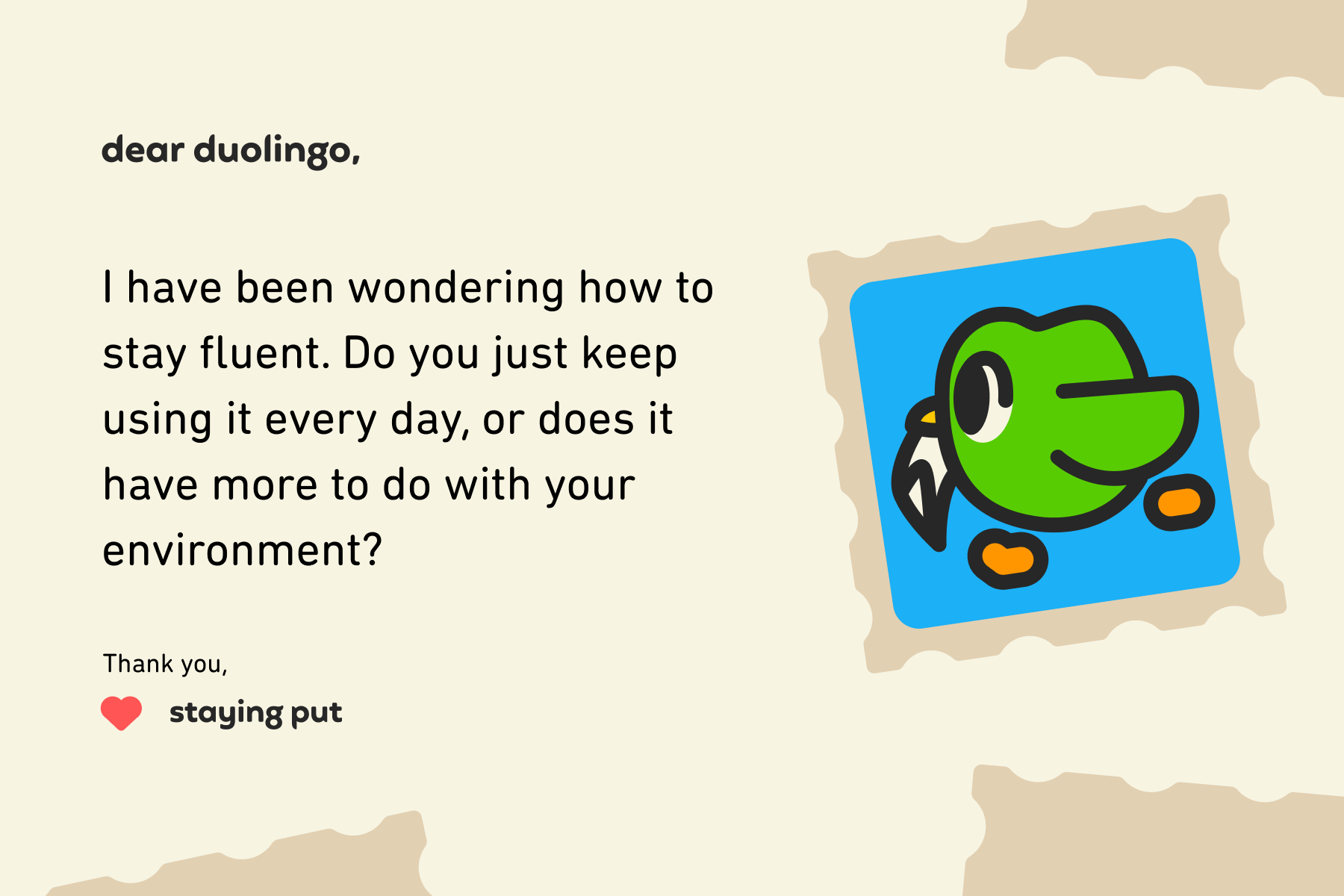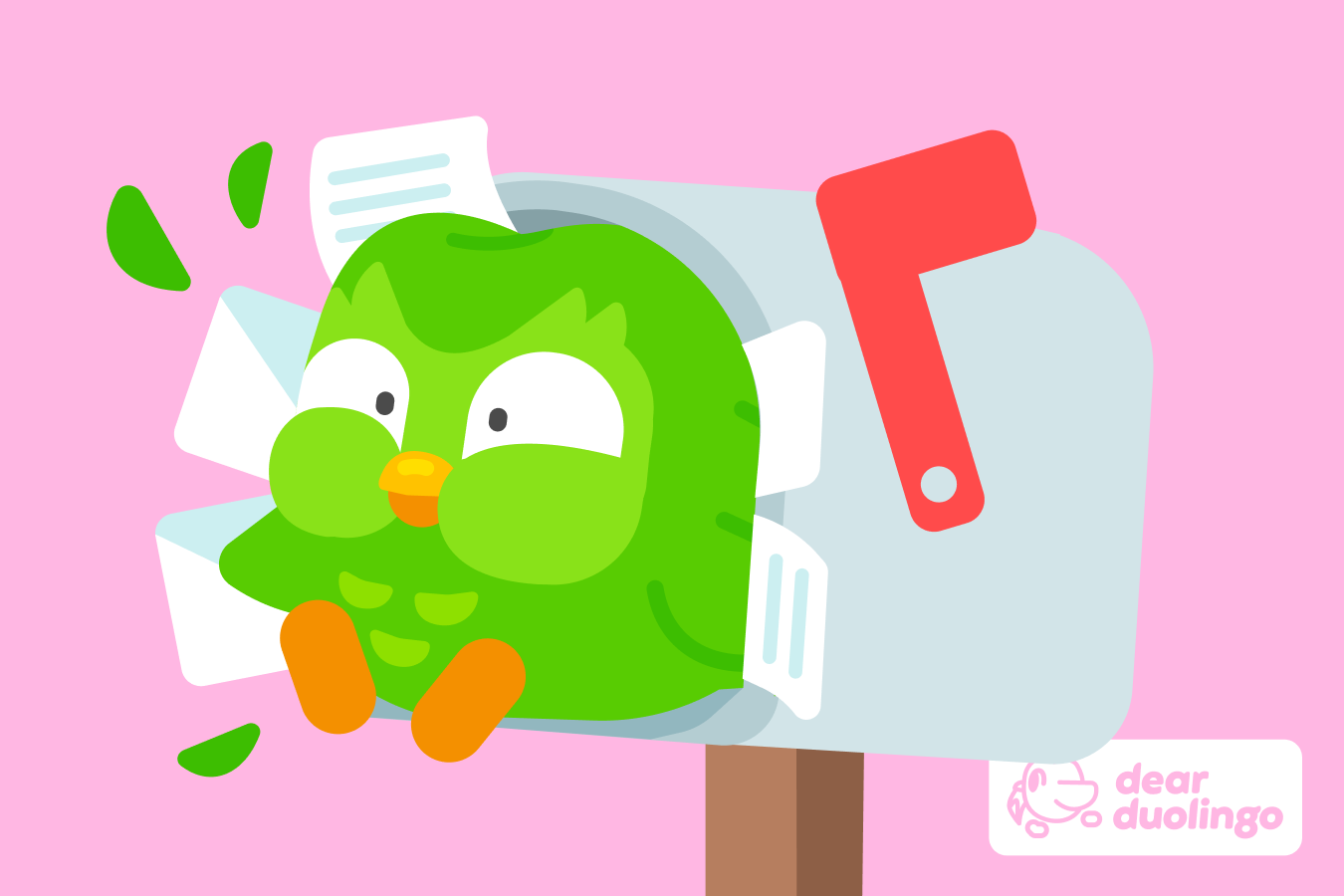Welcome to another week of Dear Duolingo, an advice column just for learners. Catch up on past installments here.
Hi, everyone! We're back this week with a problem many learners dream of having. Is this question on your mind… yet? 😅

Well, Staying Put, the answer is both: It's up to you and your environment. Really, it's about the environment you create for yourself! So while you don't necessarily have to drop everything and move abroad to immerse yourself, you will have to look for opportunities in your everyday life to practice your language.
Think of language learning like training for a race. If you work to run a 5K at a particular pace, achieving that goal doesn't mean you'll be able to run that pace forever—especially if you stop training! So if you used to run a 8-minute mile, you wouldn't assume you could do it today! 😉
Your language skills gradually weaken no matter your proficiency level—whether your ability is that of a linguistic marathoner or a casual jogger. Being "fluent" isn't a concrete goal, since it means different things to different people and it's not a measurable endpoint. There's always more to learn! Instead, learning a language is about building a system for understanding. And that's why it has to be maintained like a skill and not like a set of facts you can memorize and know forever!
There are lots of things you can do every day to stay in (conversational) shape, but it does take serious commitment and time.
Here's why. 🧠
Language is a muscle (sort of)
There might not be a specific language muscle the way your biceps are muscles, but it's a useful comparison!
Language requires lots of repetition. Just like practicing an instrument or playing a sport, learning a language means tons of practice—and significant practice, not just one lesson (or one scale, or one drill). To stay good at your language, sport, or instrument, you need to work at it repeatedly, over a long time.
Language requires gradual increase of difficulty. Once your language muscle gets good and strong, doing the easiest tasks (like reviewing Section 1 to keep your streak alive 🫣) won't help you stay linguistically strong. You need to interact with language appropriate to your level, whether we're talking grammar, sufficiently challenging arrangements, or the right weight resistance.
Language gets weaker if you don't use it. If you don't force your brain (and ears, and mouth) to keep using the connections between words, grammar, and pronunciation, those neural pathways get cloudier and slower. If you used to be able to do 50 pushups but you stop working out, your muscles will get used to not doing them! Having achieved the skill once doesn't mean you'll have it forever.
So, how can you keep your language muscle in the best shape of its life?
Language exercises to stay strong
Like I’ve said before, language is like a muscle 😜 If you used to be a serious soccer player, those skills and movements will come back to you more quickly after a long break than if you had never trained before.
Thankfully, the same is true for language: Your brain retains traces of those linguistic memories, so exercise them every day to recover them or keep them healthy and strong.
This doesn't necessarily mean extensive lessons or lengthy conversations—but you need exposure to the language every day and to interact with it regularly.
Of course, not everyone knows speakers of the language to practice with. If you do, great! But luckily, there are many easy, fun, and free ways to keep up with your language, in addition to conversation practice with a pal:
- Use Duolingo, of course!
- Change your phone's language
- Listen to playlists in the language (or listen to Duolingo's playlists on Spotify!)
- Watch movies and TV (including anime) in the language
- Switch the language of your favorite video games
- Follow social media accounts that create content in the language
Look for ways to mix language in with your hobbies. If you cook, look for recipes written in the language. If you do yoga or follow exercise content on YouTube, find instructors who speak the language. Even at the gym, you can start counting reps in the language you're learning!
Flex your language muscle 💪
Learning a language is building a skill for a lifetime—and just like being a musician or athlete, there will be times in your life when you're at peak performance, and other times when you're a little rusty. And that's ok! Let language be a skill that serves you in different ways at different stages. 💚
For more answers to your language and learning questions, get in touch with us by emailing dearduolingo@duolingo.com.
